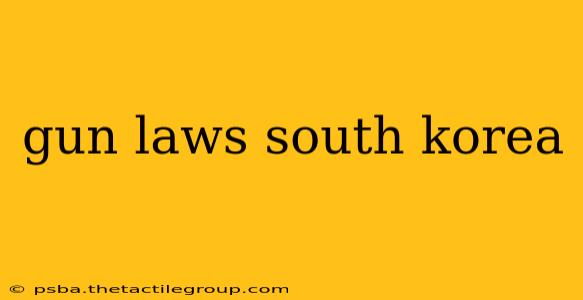South Korea maintains some of the strictest gun control laws globally, reflecting a cultural emphasis on societal harmony and a low tolerance for violent crime. Understanding these regulations requires looking beyond the simple statement of "strict" and delving into the specifics of acquisition, ownership, and usage. This post will explore the multifaceted nature of South Korean gun laws, examining the legal framework, its effectiveness, and potential areas for discussion.
Acquisition and Ownership: A High Bar to Clear
Obtaining a firearm in South Korea is exceptionally difficult. The process is rigorous and involves numerous hurdles designed to significantly restrict access. This includes:
-
Extensive Background Checks: Applicants undergo thorough background checks, scrutinizing their criminal history, mental health records, and even their overall character. Any minor infraction or indication of instability can lead to disqualification.
-
Strict Eligibility Criteria: Only specific individuals meet the eligibility criteria. These typically include those with a demonstrable need for a firearm, such as licensed hunters or security personnel with specific training and licensing.
-
Mandatory Training and Testing: Successful applicants must complete extensive training courses covering safe handling, storage, and responsible firearm ownership. Subsequently, they must pass rigorous proficiency tests to demonstrate competency.
-
Limited Types of Firearms: Even for those who pass all the preceding stages, the types of firearms permitted are severely limited. The acquisition of semi-automatic weapons and other high-capacity firearms is effectively prohibited.
-
Renewals and Regular Inspections: Firearm licenses are not permanent. They require regular renewal, often accompanied by additional checks and inspections to ensure continued compliance and safe storage practices.
Penalties for Illegal Gun Possession: Severe Consequences
The penalties for illegal gun possession in South Korea are severe, reflecting the nation's zero-tolerance policy towards firearms misuse. These penalties can include:
-
Imprisonment: Significant prison sentences are common for illegal possession, ranging from several years to decades depending on the severity of the offense.
-
Substantial Fines: Along with imprisonment, substantial fines are levied, acting as a powerful deterrent against illegal gun ownership.
-
Criminal Record: A criminal record for gun-related offenses can have significant long-term repercussions, affecting employment, travel, and other aspects of daily life.
Effectiveness and Societal Impact: A Low Rate of Gun Violence
South Korea's strict gun control laws are widely considered effective in minimizing gun violence. The nation consistently boasts one of the lowest rates of gun-related crime among developed nations. This success can be attributed to a combination of factors including:
-
Rigorous Enforcement: The strict laws are coupled with diligent enforcement, ensuring consistent application and minimizing loopholes.
-
Cultural Norms: South Korean society's emphasis on order and respect for authority contributes to the overall effectiveness of the gun control measures.
-
Limited Access to Illegal Firearms: The combination of strict laws and effective enforcement makes acquiring illegal firearms exceptionally challenging.
Areas for Ongoing Discussion and Potential Refinements
While South Korea's gun control system is effective, continuous evaluation and potential refinements are always necessary. Areas for ongoing discussion include:
-
Balancing Security and Rights: Finding the optimal balance between public safety and individual rights remains an ongoing challenge.
-
Addressing Emerging Threats: The rapid evolution of firearms technology necessitates constant adaptation to emerging threats and evolving methods of illegal acquisition.
-
International Collaboration: Working with international partners to combat the global illicit arms trade can further strengthen South Korea's efforts.
In conclusion, South Korea’s gun laws represent a robust and effective approach to firearms control. The stringent regulations, coupled with rigorous enforcement and societal norms, contribute to a remarkably low rate of gun violence. However, ongoing dialogue and adaptation remain crucial to ensure the system's continued effectiveness in addressing current and future challenges.

